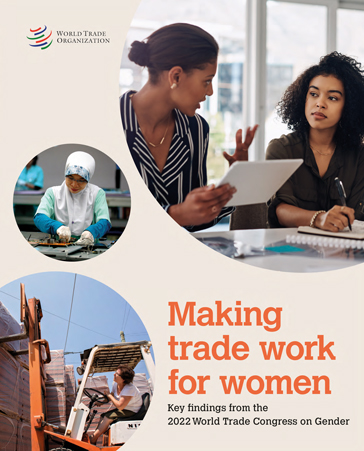publicaciones
El comercio al servicio de las mujeres:
principales constataciones del Congreso Mundial del Comercio sobre el Género de 2022
Algunos estudios han demostrado que la elaboración de políticas más sensibles a las cuestiones de género conduce a una mayor igualdad de género en el comercio, contribuye a reducir la pobreza y promueve el desarrollo sostenible. Esta publicación se basa en los trabajos de investigación presentados en el Congreso Mundial del Comercio sobre el Género celebrado en la OMC en diciembre de 2022, que reunió a expertos internacionales de las cuestiones sobre comercio y género para que expusieran sus conclusiones más recientes.
La publicación se centra en la manera de ayudar a las mujeres empresarias a aprovechar las ventajas del comercio internacional. En ella figuran estudios y análisis recientes sobre las desigualdades de género en diversos ámbitos. Asimismo, se examina la forma en que las políticas comerciales pueden servir de guía en futuras negociaciones comerciales, y la forma en que la liberalización arancelaria y la reforma de la política comercial pueden abordar las cuestiones de género y reducir la brecha salarial de género.
Publicada en 2023.
Descargar la publicación completa
Índice
- Agradecimientos
- Prólogo
- Capítulo 1: Gender equality, trade and the WTO
- Capítulo 2: Facilitating women’s economic empowerment through trade with voluntary sustainability standards
- Capítulo 3: Assessing the potential of trade policy reform for closing gender wage gaps
- Capítulo 4: Lived experience of women entrepreneurial exporters in a developing country context
- Capítulo 5: Women’s exporting success: evidence from Canadian small and medium-sized enterprises
- Capítulo 6: Gender and trade: How are gender provisions in trade agreements perceived by Chilean women exporters?
- Capítulo 7: Gender equality and women’s empowerment in the African Continental Free Trade Area: What lessons can be learnt from the SADC?
- Capítulo 8: Negotiating towards a tailor-made gender protocol under the AfCFTA: Could integrating Africa’s fragmented gender chapters be the key?
- Capítulo 9: The role of regional governance on shaping trade and gender nexus policy in the pandemic and recovery: Asia-Pacific practices and perspectives
- Capítulo 10: Entrepreneurial responses to COVID-19: gender, digitalization and adaptive capacity
- Capítulo 11: Sustainable development and women’s empowerment: the challenges and opportunities of digitalization
- Capítulo 12: Gender mainstreaming in trade agreements: “A Potemkin Façade”?
- Capítulo 13: Trade negotiation dialogue and capacity building: applying the PXA Framework
Compartir
Si tiene problemas para visualizar esta página, sírvase ponerse en contacto con [email protected], y proporcionar detalles sobre el sistema operativo y el navegador que está utilizando.
